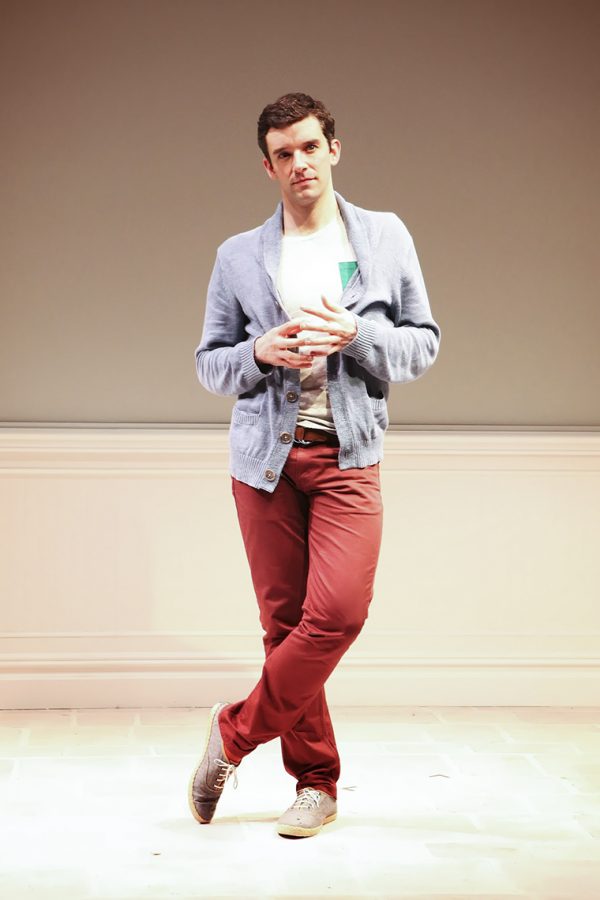Talking to himself
Michael Urie performs in “Buyer & Cellar,” the one-man comedy written by playwright Jonathan Tolins.
May 12, 2014
Michael Urie, a 2003 Julliard School alumnus best known for his role on ABC’s “Ugly Betty” as Marc St. James, the flamboyant, adversarial personal assistant to Mode magazine editor Wilhelmina Slater, will take the stage across the U.S. this summer with Jonathan Tolins’ off-Broadway comedy and one-man show “Buyer & Cellar.”
The show’s national tour began May 10 at Chicago’s Broadway Playhouse at Water Tower Place, 175 E. Chestnut St., and runs through June 15 in Chicago.
“Buyer & Cellar” tells the story of struggling actor Alex Moore, who Barbra Streisand hires to man the shops in the strip mall located in the basement of her California home. Urie plays Moore, his boyfriend, Streisand, her husband James Brolin and the various employees working at the large manor.
Hailing from Plano, Texas, Urie has been heavily immersed in theater his entire life. However, during the 2006–2010 “Ugly Betty” run, Urie took a break from the stage only to make a big comeback for the resurrection of the Broadway smash “How to Succeed in Business Without Really Trying” with Jonas Brothers member Nick Jonas in 2012. The show was nominated for nine Tony Awards for its revival run in 2011, which then starred Daniel Radcliffe of the “Harry Potter” series.
The Chronicle spoke with Urie on the phone to discuss the making of “Buyer & Cellar” and his passion for theater.
THE CHRONICLE: How did you prepare for “Buyer & Cellar?”
MICHAEL URIE:I screwed up a lot. I’ll be honest. There was a lot of failure. There was a lot of blowing it in rehearsal. I [did] speech and debate in high school and that was a huge part of my training. I would do humorous interpretation, which is a 10-minute excerpt from a published work where you can play as many characters as you want.
CC: What is the most challenging aspect of playing multiple characters?
MU: It was really hard to learn [both] the lines of the character with the problem but also the character who is creating the problem. When you learn one side of a conversation in a dialogue scene, you have other [people’s lines] to help you remember what you have to say. Sometimes [when acting with others] you can just be like, “Oh yeah, I remember what this argument is,” and I go in knowing that and I remember the lines as I play it out. You can’t do that when you’re the only one.
CC: Is “Buyer & Cellar” the first one-man show you have performed?
MU: [Yes] … I had done another play where there were only two performers [and] there were three long monologues, but even that was only 25 or 30 minutes long. This play is 95 minutes or more, depending on the night—that took stamina.
I really had to develop the muscles to do that, sort of like when you set goals at the gym. If you say your goal is to run a 10-minute mile, eventually you can, and then it gets [much easier].
CC: So is it a mental challenge?
MU: And your body. Any show that’s physically demanding, eventually when you do it for long enough, you stop sweating. [When] I was in a Broadway musical, there were these huge dance numbers that at first made me sweat like a pig. Eventually my body got used to them and I stopped sweating.
CC: What do you think people will like about the show?
MU: Anybody who likes Barbra Streisand is going to like watching this fantasia of Barbra Streisand. But I think it’s also such a good play.We go to the theater to have a story unfold, and we choose the theater instead of television and movies because it’s generally thought-provoking and surprising. I think the unexpected treat that you get is a workout of your imagination. So often in TV and movies and Broadway shows, the imagination gets to take a break because everything is shown, especially in movies. You can show everything. They can create anything before your eyes. We don’t create really anything—it’s me and words and a few projections, but they’re not literal projections, and some lighting cues and some sound cues, but then you have to come up with the rest of it. [For example], I give you a voice and a sort of look to the character, but then you have to fill in the rest. You have to imagine what they look like and imagine what the rooms look like in this basement mall.
CC: Do you prefer performing on stage or on TV?
MU: It’s definitely a different love. I started my first professional jobs in theater, and I go back whenever I can. The immediacy is like drugs. It feels so good to tell a whole story in a night for the same group of people and share that experience. With TV and film, it’s such a collaboration. It’s very gratifying, and certainly in the end when it’s finally on TV or finally in theaters or finally on DVD or whatever, it is so gratifying to be able to say, “I did that. I made that with those people,” [but] it’s never in here, in this room right now, happening for you. That’s the gratification of doing theater, and playing a character from beginning to end in one story and getting to try it over and over and over again is a different way of perfecting something. A movie can be perfected because you have time and resources and collaborators, but with a play you have [to use] repetition to perfect moments and ideas and the way you tell the story. It’s like an ever-changing, living, breathing thing.








